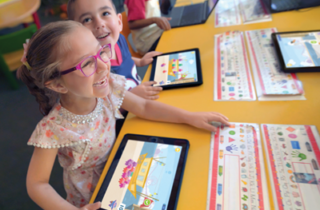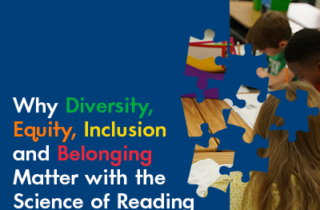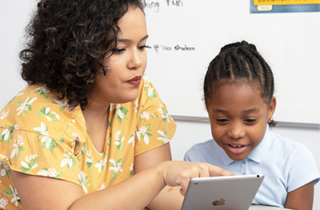Presented by Aruna Gilbert, Chief Program and Policy Officer, Early Learning Coalition of Palm Beach County; and Rebecca Palacios, Ph.D., NBCT, Senior Curriculum Advisor, Age of Learning
Presented by Sam Deffes, M.Ed., Professional Learning Literacy Advisor, Learning Without Tears; and Yasmin Lynch, M.A., Bilingual National Presenter, Learning Without Tears
Presented by Diana Hughes, VP of Product, Age of Learning
Presented by Dr. Tim Odegard, Murfree Chair of Excellence in Dyslexic Studies and Professor of Psychology, Middle Tennessee State University; Dr. Jennifer Zoski, Staff Learning Scientist, Amplify; and Dr. Deni Basaraba, Manager of Learning Science, Amplify
While PreK teachers obviously want to have a positive impact on students’ language acquisition, recent research shows that it’s the quality, not the quantity, of those interactions that help build a strong foundation.
Presented by Dr. Tricia Zucker, Co-Director, Children’s Learning Institute at the University of Texas Health Science Center at Houston; Heidi Veal, Early Childhood Literacy and Programs Administrator, LISD Learning and Teaching; and Dr. Deborah Bergeron, Deputy Director of Engagement and Innovation, National Head Start Association
Presented by Dr. Lili M. Levinowitz, Director of Research, Music Together Worldwide, and Professor Emeritus, Rowan University
Moderated by Lisa Chouteau, Senior Video Producer and Manager of Video Production, Music Together Worldwide
Presented by Dr. Donna Housman, CEO, Housman Institute
Presented by Dr. Barbara Nemko, Superintendent, Napa County Office of Education (CA); Olivia Martinez, English Language Development & Biliteracy Director, Pharr-San Juan-Alamo ISD (TX); Jennifer Jelavich, Colusa County District Administrator, Colusa County Office of Education (CA); and Pinky Jelavich, Jennifer’s Assistant, Colusa County Office of Education (CA)
Moderated by Ilene Rosenthal, CEO, Footsteps2Brilliance
In a recent edWebinar sponsored by Kaplan Early Learning Company, “Embracing Anti-Bias Classrooms: A Response to Racism in America,” four recognized early childhood education specialists, and lead authors of the newly released book Don’t Look Away, Embracing Anti-Bias Classrooms, emphasized that to challenge bias, educators have to recognize the role implicit bias, microaggression, and white privilege hold in undermining the learning experiences of marginalized Black and brown children.









